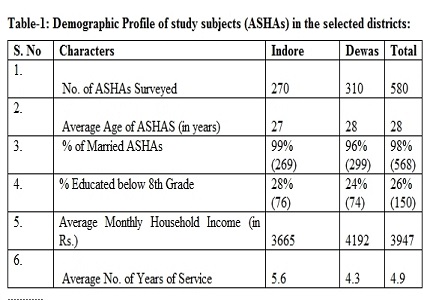Skill based training of accredited social health activists: training effectiveness assessment using training and programme evaluation model
Abstract
Background: Accredited Social Health Activists (ASHAs) are gross root health workers introduced under NRHM; for delivery of health services in rural areas. Training them for capacity building and functioning was a big challenge which has been tackled through skill based training. The study has been done to evaluate training effectiveness using managerial approach (Kirkpatrick’s model) and find out the gaps and suggest measures to improve ASHAs knowledge and skills.
Methods: A cross sectional study on 580 ASHAs selected by sequential random sampling at training centres of Indore and Dewas districts. Sample size reduced to 10% of original for qualitative assessment. Interview of subjects and inspection of records was done using questionnaires/Performa. Paired, unpaired t test, Mcnemar test were applied with p<0.05for statistical significance.
Results: Significant improvement in knowledge was found and the mean knowledge score got almost doubled after training (from 8.68 to 15.27 in a 30 point score, paired t test p<0.0001). 80% of ASHAs learnt the skills of hand washing, recording temperature and applying eye ointment and 50-60% learnt skill of weighing newborn, preventing baby from cold.
Conclusion: Training was helpful in improving knowledge, skills and activities done by ASHAs. But still very few ASHAs were able to score passing marks and competent in all skills essential for new born care.
Downloads
References
Ministry of Health and Family Welfare (MoHFW). (2005c). ASHA. Government of India. Accessed July 20, 2008 from http://mohfw.nic.in/NRHM/asha.htm
Mahyavanshi DK, Patel MG, Kartha G, Purani SK, Nagar SS. “A cross sectional study of the knowledge, attitude and practice of ASHA workers regarding child health (under five years of age) in Surendranagar district”. Healthline 2011; 2(2): 50.
İpek Kalemci TÜZÜN. General overwiew of training Effectiveness and measurement Models. Journal of Commerce & Tourism Education Faculty, Year: 2005 No: 1 :144-156.
Eseryel D. Approaches to Evaluation of Training: Theory & Practice : Journal of Educational Technology and Society, 2002 5(2), 93-98.
Stufflebeam, D. L.. The use of experimental design in educational evaluation. Journal of Educational Measurement, (1971a) 8(4), 267-274.
Alkin, M. C. & Christie, C. A. An evaluation theory tree. In M. C. Alkin (Ed.) Evaluation roots: Tracing theorists’ views and influences. Thousand Oaks, CA: Sage. (2004). (pp. 12-65).
Scriven, M. Evaluation, bias and its control. Journal of Multi Disciplinary Evaluation, (2011). 7(15), 79-98.
Stake, R.E., & Abma, T.A. Responsive evaluation. In S. Madison (Ed.), Evaluation encyclopaedia Thousand Oaks, CA: Sage. (2005). (pp. 376-379).
Evaluation models : new directions for evaluation© jossey-bass, a publishing unit of john wiley & sons, inc. , no. 89, spring 200.
Donald L Kirkpatrick, James D Kirkpatrick. Evaluating training programs : the four levels:3rd edition , Berrett-Koehler, 2012.
Stone, J., & Watson, V. Evaluation of training. (2007), from http://www.isip.org/isip-cpc/resrcs/Evaluatn.doc
Guleri SK, Dixit S, Sakalle S, Bhagwat AK, Yesikar V, Pandey D. A rapid appraisal of training issues of ASHAs (Accredited Social Health Activist) in Madhya Pradesh. Public health rev: Int J Public health res 2014;1(1):3-8.
creative research system survey software ,http://www.surveysystem.com/sample-size-formula.htm
Maroof KA, Parashar P, Bansal R, Ahmad S. A study on hypertension among the bank employees of Meerut district of Uttar Pradesh. Indian J Public Health. 2007 Oct-Dec;51(4):225-7.
Nirupam Bajpai and Ravindra H. Dholakia “Improving the performance of accredited social health activists in india” Working Paper No. 1 May 2011.
Janet Brandling et al “Evaluating Mental Health First Aid Training for Line Managers working in the public sector” Mental Health First Aid Training Evaluation March 2010.
Foreman P et al. Evaluation of education and training of staff in dementia care in acute setting” ay 2007, Australian Institute Of Primary Care.
Swain S, Swain P, Nair KS, Dhar N, Gupta S, Nandan D. A rapid appraisal of functioning of ASHA under NRHM in Orissa. Health and Population: Perspectives and Issues 2008; 31(2): 73-79.
Smitha Kochukuttan, TK Sundari Ravindran, Suneeta Krishnan. Evaluating Birth Preparedness and Pregnancy Complications Readiness Knowledge and Skills of Accredited Social Health Activists in India. International Journal of MCH and AIDS (2013), Volume 2, Issue 1, Pages 121-128.
Shrivastava, S.R, & Shrivastava, P.S (2012). Evaluation of trained accredited social health activist (ASHA) workers regarding their knowledge and attitude and practice about child health. Rural and Remote Health, 12(4): 2099.
Jain N, Srivastava NK, Khan AM, Dhar N, Manon S, Adhish V, Nandan D. Assessment of functioning of ASHA under NRHM in Uttar Pradesh. Health and Population: Perspectives and Issues. 2008; vol 31 (2): 132-140.
Patel T, Raval D, Pandit N. Process evaluation of routine immunization in rural areas of Anand District of Gujarat. Healthline 2011; 2(1): 17.



 OAI - Open Archives Initiative
OAI - Open Archives Initiative


